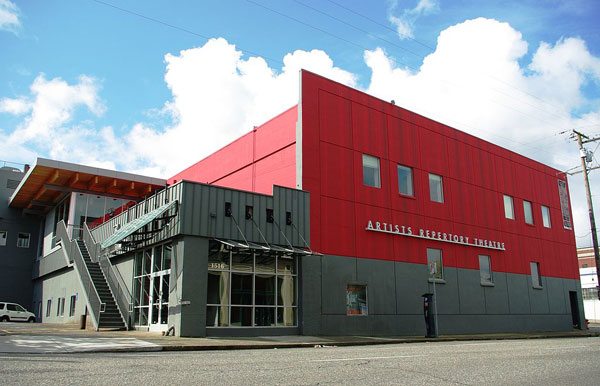
January 2, 2018; Willamette Week
Artists Repertory Theatre (ART) in Portland, Oregon, is the city’s oldest professional theater company, and, as reported by Nigel Jaquiss for Willamette Week, a company that “has earned a reputation regionally and nationally for its ambition and creativity.” That ambition, at least in terms of the real estate occupied by the nonprofit theater organization, led to the purchase of a full city block back in 2004 for $4.88 million. But after four straight years of red ink—despite artistically acclaimed work—ART now plans to sell half its property to a developer in order to stabilize its finances.
The world has turned a time or two since 2004, of course, and ART, along with other nonprofit arts groups in Portland and elsewhere, have had to weather the Great Recession, a changing audience, an increasingly challenging fundraising environment, and, in many cases, both the benefits and challenges of urban redevelopment. Writing for Oregon Public Broadcasting (OPB), April Baer describes the site purchased by ART in 2004 as being in “a gritty part of southwest Portland.” She notes that the nonprofit raised most of the original $4.88 million purchase price by 2007, and that in the last decade, “the building’s value grew 67 percent to $8,192,530.” She also underscores the company’s artistic merits and box-office and fundraising successes:
Artists Repertory Theatre has a reputation in theater circles as a company that bets big on quality. Its seasons are heavily freighted, averaging eight shows per season of classy, high-octane work by hot playwrights like Pulitzer-winner Lynn Nottage and Yussef El Guindi. They tackle subjects like racism, the Great Recession and climate change. Under [artistic director Dámaso] Rodríguez’s leadership, Artists Rep has set new standards for equity onstage and off…The public responded. An analysis of Artist Rep’s financial records shows that for the last years records were available ticket receipts boomed and fundraising went up dramatically, by $656,000. But that hasn’t been enough to stave off a dramatic reckoning in the organization’s assets.
Last year, the IRS filed a lien against ART “for lapses in in its payroll tax filings going back to 2012. In total, the company owed $309,000 to the federal government.” According to Sarah Horton, the now-former managing director who just recently left ART, that debt was paid off last month. There is now a second lien for the mortgage and, thus, an urgent need to stabilize finances—and an opportunity to do so by selling off part of the property.
While the sale and the building plans have not yet been finalized, the half of the property being sold will likely be purchased by Atlanta-based Wood Partners and developed into a 20-story, mixed-use residential and commercial property. Jaquiss notes this “would change the face of Goose Hollow, a Southwest neighborhood left largely untouched by the fast-paced redevelopment of much of downtown.” The sale would allow ART to settle its debts, make additional renovations to its remaining space, and establish an endowment.
Sign up for our free newsletters
Subscribe to NPQ's newsletters to have our top stories delivered directly to your inbox.
By signing up, you agree to our privacy policy and terms of use, and to receive messages from NPQ and our partners.
Mike Barr, chair of the ART board of trustees, told Jaquiss that back in 2004, the board members made a “prescient decision” when they bought the land in Goose Hollow. That may be so, but it could also be argued that they overreached in purchasing and developing that large of a property, and that the business model associated with managing and maintaining such a large space, even with other arts tenants contributing revenue to what has evolved into the Arts Hub at ART, might not have been sustainable, even without so many changes in the external environment. With an annual budget of nearly $4 million, the company had $1.3 million in red ink over the last four years, as reported by Jaquiss, due in no small part to those mortgage payments on that $4.88 million real estate purchase the nonprofit made in 2004. And then there is that troublesome problem of not paying payroll taxes, which may speak to broader financial management challenges.
In a hot town like Portland, ART may well find its financial footing again by selling off part of its property. Of course, we hope that the board also takes the reprieve that the infusion of cash will bring to make sure that financial management is in much stronger shape going forward. Not all nonprofits are so lucky as to get such second chances.
And, clearly, the community will win if an artistically excellent arts group weathers this storm. That said, the OPB report notes that real estate transactions are not an easily replicable recipe for success:
In making this move, Artists Rep joins a small circle of arts groups that have taken matters into their own hands during a breakneck real estate market. Oregon Ballet Theatre sold its headquarters in 2015 to retire its debt and make a fresh start. A year later, Imago Theatre announced plans to sell its stately brick building off Burnside Avenue. But most companies and artists can’t afford to buy a building that might turn out later to be a long-term asset. Instead, they’re tossed on the waves made when owners cash in on a high-demand market.
—Eileen Cunniffe












